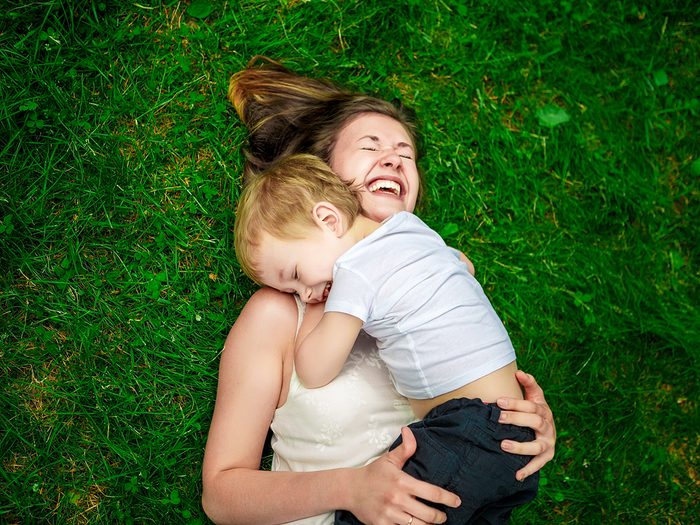7 Ways Kids Can Make You Healthier

Stressed and overworked? Take lessons from the kids to improve balance in your life
Sometimes thinking like a kid is the best way to sail through the gamut of grown-up challenges parenting throws your way. From getting fit to maintaining your emotional balance, acting childish may just be the best way to go.
Here are seven ways that emulating your kids may make you healthier and happier.
1. Opt for your toddler’s healthy snacks
Eating the same healthy snacks as your toddler can help you feel better. Frozen grape halves and icy banana-on-a-stick combine vitamins and fibre, with a lot less sugar than a frappuccino. And while non-fat foods are often assumed to be the healthy choice, opting for your toddler’s full-fat alternatives may be better in the long run. “If 2 percent fat yogurt’s eaten on its own, the 2.5 to 3 grams of fat (about 1/2 a teaspoon) will take a little longer to digest, helping you feel full longer,” says Mary Bamford, a Toronto-based registered dietitian.
(Related: A Guide to Healthy Eating for Kids, Straight from a Pro)
2. Child’s play reminds you fitness should be fun
Whether it’s chasing butterflies, playing tag or body surfing, when left to their own devices, kids will burn off calories in ways that are fun, fun, fun! That’s why they don’t get bored playing. Similarly, adults should find workouts that are f-u-n—there’s no stronger motivation out there.
(Related: 8 Dance Workouts Perfect for People Who Hate Exercising)
3. Do like toddlers and preschoolers and recover quickly—and keep going
If it’s been a while since we’ve worked out, we adults can come up with a lot of reasons why we can’t get back to our regimen. Too tired. Out-of-style workout gear. Cross-trainers got dirty. Little kids, on the other hand, have a resiliency we’d do well to adopt. When they fall on their butts, they cry, and then get back up and start moving again.
4. Learn to say “no” like little kids
Your brother asks you to babysit his kids again—even though it’s the third time this month and he has yet to reciprocate. Your supervisor thinks you’d be the perfect person to organize the company’s virtual social club. Make like a toddler and shout after us: “No! No! No!” Okay, maybe a tantrum isn’t the best route, but there’s no reason “I’m sorry, but I’m overextended as it is,” “You’re sweet, but no thanks” or “Maybe another time” can’t work. If “no” is going to help you maintain your emotional equilibrium then say it.
5. Master “timeout”
“Take a brain break,” says Karyn Hood, a clinical psychologist. “People often find that focus and productivity improve once they return to a task after a brief reprieve—with renewed determination and increased energy to tackle the rest of the day.” If you’re about to lose it after spending hours on the same spreadsheet or hanging out with a grouchy baby remove yourself from the source of stress. During work hours, go for a walk or grab a java or find responsible childcare so you can get a one-hour break. Look for a community centre offering parent relief services, work out outside, or see if a relative or friend can pop by for a bit so you can take a breather.
(Related: 9 New Books to Read to Ease Stress and Reset Your Mind)
6. Remember that messy = fun
Kids know having fun is more important than staying mess-free. Chances are, your personal trainer and family doctor would prefer that you (and your kids) prioritize stress-relieving outdoor fun over staying neat and tidy, too.
7. Relearn portion control
Kids eat until they’re full. Many adults, on the other hand, eat until their plates are clean. And with today’s outsize restaurant portions skewing perceptions of correct portion sizes, that’s a problem. Eat like a kid instead: Graze until you’re about 90 percent full, then stop. You’ll be amazed at how much healthier you feel.




